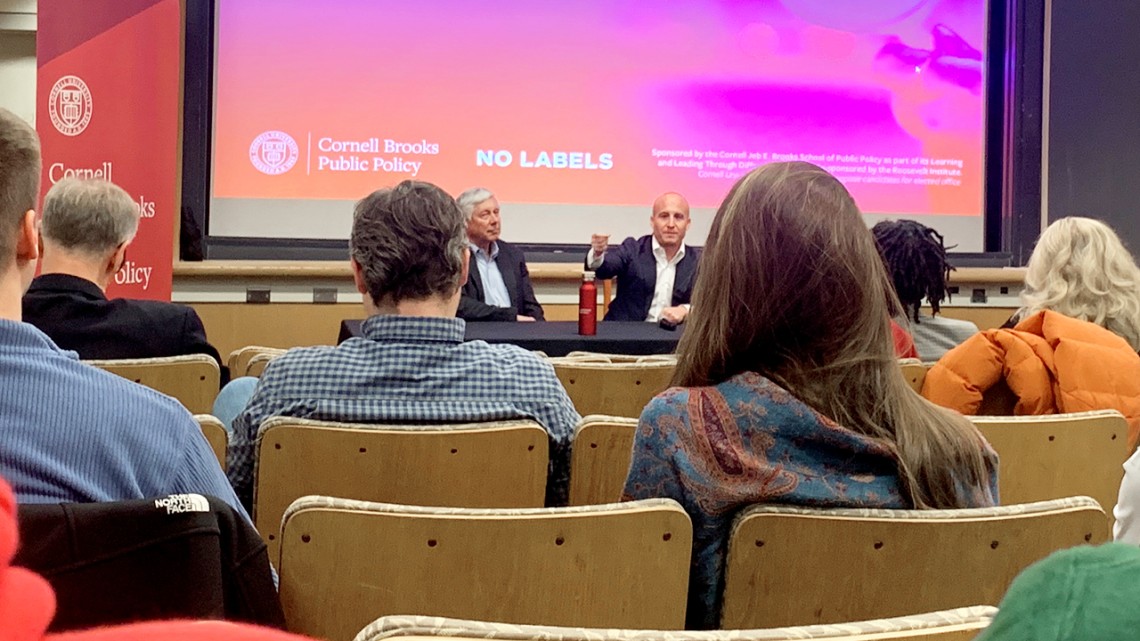
Former congressmen Fred Upton (left) and Max Rose provide a Kaufmann Auditorium audience with an inside look at how Congress functions. They also offered insight into how civil discourse and compromise can be more regular features of U.S. government.
News directly from Cornell's colleges and centers
Former congressmen offer strategies for overcoming polarization and performative politics
By Jim Hanchett
Two former U.S. representatives say Congress can govern effectively if lawmakers focus on civil compromise rather than building TV and social media brands.
Max Rose, a New York Democrat, and Fred Upton, a Michigan Republican, headlined “Searching for the Center.” The March 21 on-campus event was sponsored by the Cornell Jeb E. Brooks School of Public Policy.
It launched the Brooks School’s new Learning and Leading Through Difference Initiative, an effort to strengthen democracy, advance conflict resolution, and develop students to be thoughtful, purpose-driven leaders.
“We are living in a politically divisive time, where it is difficult to advance policies to combat serious societal challenges,” said Brooks School Dean Colleen Barry as she opened the program. “On our campus and beyond, connecting across difference matters more than ever and policy schools like ours have an important role to play in this work.”
Rose and Upton were introduced by Liz Morrison, co-executive director of No Labels, an organization seeking ballot access in many states to run a bipartisan “unity ticket” for president in 2024. Cornell University does not endorse or oppose candidates for elected office. The Roosevelt Institute at Cornell, a non-partisan student-run think tank, co-sponsored the event.
Rose represented Staten Island and a section of Brooklyn in the 116th Congress. “What I saw every day is that every member of Congress has now become in this weird world we live in a product to be branded and marketed,” Rose said. “So many members are motivated by so many forces that have nothing to do with legislative progress. They have to do with how many retweets did you get, how many small dollar donations did you get. There are these perverse incentives pushing people along every day. You don’t get on TV for passing legislation. You get on TV for dividing, for saying things that are incendiary.”
Despite the ascension of performative politics, Rose said the untold story of recent Congresses is how much significant, bipartisan legislation has been passed, shepherded by leaders of both major parties. “The way you get stuff done is under the radar,” Rose said. “You don’t talk about it.”
Upton represented southwestern Michigan in Congress for 36 years. For six years, he served as Chairman of the Committee on Energy and Commerce and was one of the founding members of the Problem Solvers Caucus.
He pointed to two small strategies that could ease polarization. On his committee, bills that were bipartisan (sponsored by at least one member of each party) took precedence over bills that came only from one side of the aisle. “Those bills were going to pass because people were talking together,” Upton said. “That personal relationship really does matter, that gets things done.” Voters could also promote civility in politics by rewarding lawmakers who remain local in their approach – walking in parades, going to festivals and doing their politicking on a retail basis rather than through cable TV hits. That will reduce the benefits of extremism, Upton said.
After answering questions for nearly 90 minutes, Upton and Rose met with members of the audience for casual conversation. Barry said there will be more such events in the Brooks School Learning and Leading Through Difference Initiative: “To advance our goals, we will bring distinguished policy leaders to Cornell as we are doing today to engage with our community on critical issues from varied political viewpoints with a focus on fostering constructive dialogue.”
Jim Hanchett is assistant dean for communications for the Cornell Jeb E. Brooks School of Public Policy.
Media Contact
Get Cornell news delivered right to your inbox.
Subscribe
